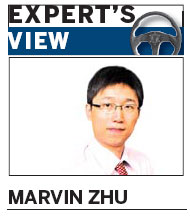|
Highly regarded VW: Analysts are watching the fallout after the carmaker opted for a software fix rather than a recall for problems with its highly touted DSG transmission. [Photo/Agencies] |
Life should be pretty easy for Volkswagen at the moment.
Statistics show the group sold 2.3 million vehicles globally in 2011. It seems just a matter of time before the German giant overtakes GM and Toyota to become the world leader.
In China, Volkswagen's biggest market, sales increased 19 percent in the first four months, nearly quadruple the average growth of the entire market.
In the 30 years Volkswagen has been operating in China, the company has been frequently challenged by its competitors, but never caught.
Its oldest models, the Jetta and Santana, still sell more than 10,000 units each month. Its latest Passat and Magotan are causing Honda and Toyota to sweat.
Although issues regarding product quality, service and other aspects of VW have been reported, the public would rather believe these problems are at acceptable levels and will be resolved quickly.
In most cases, VW is much more fortunate than others, whose mistakes would normally be scrutinized for a long time. These mistakes are often attributed to the condition of the Chinese market.

But VW has now found itself in difficult situation that threatens to jeopardize its enviable position.
A June announcement by Volkswagen Group said its China CEO, Carl Thomas Neumann - who goes by the Chinese name Ni Mingkai - will leave the position after only two years.
The direct cause for his reassignment, though not officially stated, is believed to be the way he dealt with problems surrounding VW's highly touted DSG transmission.
Top of the list of factors that contributed to VW's success in China in recent years has been its turbocharged engine twinned with a DSG, or dual-shift gearbox.
The combination has not only enhanced the brand's image for high technology, fuel efficiency and strong performance, but also greatly boosted sales.
But in 2010, several failures of VW cars equipped with the DSG were reported.
VW's two local joint ventures, Shanghai VW and FAW VW, extended the warranty period of the transmission as a solution. Although it temporarily reduced customer complaints, the number of failures continued to grow.
Without a clear response and solution to the problem, the situation has gradually turned unfavorable for VW.
This year, the General Administration of Quality Supervision, Inspection and Quarantine asked VW to solve the problem and recall the defective cars.
Yet the company remained silent, choosing to upgrade the software in the cars and further extend the warranty period.
As a result, more and more complaints have been received.
To make matters worse, the public has begun to doubt VW's image of safety and reliability.
Two of the most common failures of the DSG are the temperature alarm and system cutoff at high temperatures. The road conditions and driver habits are very different in China compared to Europe and the US.
Complex traffic conditions and unskilled gear manipulation may both lead to an unstable gearbox system.
As with all new technologies, it is normal to encounter conditions in the real world that are not expected in the laboratory, very often leading to failure.
In the US or other mature markets, it is common practice for carmakers to recall vehicles and conduct upgrades.
VW recalled four models with the DSG in the US in 2009 even though no failures were reported.
Yet in China, which lacks a robust recall system, a recall can be seen as a reflection of poor quality.
Toyota suffered heavily in 2010 after it announced a worldwide recall and has not fully recovered.
With the high sensitivity of initiating a recall, most carmakers would rather hide the problem and solve it secretly.
VW, even with a strong influence in China, is no exception. There is hardly any record of recalls by VW in past decades and this time is no different. Unfortunately, this time around, VW's approach does not appear to be working.
VW could have chosen a different way to deal with the problem.
They could have been honest with their customers by telling them what the problem is, how it will be fixed, and how they will be protected.
Even with a recall, the cost is much lower than the potential risk to the brand image and the future sales. That is the right approach, and matches where the company stands in the market.
Newman failed to pick the right answer. We will see if his successor thinks differently.
The author is a senior analyst at LMC Automotive. He can be reached at [email protected]
